WASHINGTON DC: The US military launched an air assault on dozens of sites in Iraq and Syria used by Iranian-backed militias and the Iranian Revolutionary Guard Quds force Friday, in the opening salvo of retaliation for the drone strike that killed three US troops in Jordan last weekend, officials told The Associated Press.
President Joe Biden and other top US leaders had been warning for days that America would strike back at the militias, and they made it clear it wouldn’t be just one hit but a “tiered response” over time. The officials confirming the initial strikes spoke on condition of anonymity to discuss military operations not yet announced.
The strikes by manned and unmanned aircraft hit more than 85 targets, including command and control headquarters, intelligence centers, rockets and missiles, drone and ammunition storage sites and other facilities. US Central Command said the strikes used more than 125 precision munitions, and they were delivered by numerous aircraft, inlcuding long-range bombers flown from the United States. One official said B-1 bombers were used.
The assault came came just hours after Biden and top defense leaders joined grieving families to watch as the remains of the three Army Reserve soldiers were returned to the US at Dover Air Force Base in Delaware.
It was unclear what the next steps will be, or whether the days of US warnings have sent militia members scattering into hiding, making it more difficult to detect and strike them. But it was evident that the recent statement released by Kataeb Hezbollah, one of the main Iran-backed militias, saying it was suspending attacks on American troops had no impact on the administration’s plans.
The US strikes appeared to stop short of directly targeting Iran or senior leaders of the Revolutionary Guard Quds force within its borders. Iran has denied it was behind the Jordan attack.
In a statement this week, Kataib Hezbollah announced “the suspension of military and security operations against the occupation forces in order to prevent embarrassment to the Iraqi government.” But Harakat Al-Nujaba, one of the other major Iran-backed groups, vowed Friday to continue military operations against US troops.
The US has blamed the Islamic Resistance in Iraq, a broad coalition of Iran-backed militias, for the deadly attack in Jordan, but has not yet narrowed it down to a specific group. Kataeb Hezbollah is, however, a top suspect.
Some of the militias have been a threat to US bases for years, but the groups intensified their assaults in the wake of Israel’s war with Hamas following the Oct. 7 attack on Israel. The war has led to the deaths of thousands of civilians in Gaza and spilled across four other countries now. Iran-backed militia groups throughout the region have used the conflict to justify striking Israeli or US interests, including threatening civilian commercial ships and US warships with drones or missiles in almost daily exchanges.
Speaking to reporters on Thursday, Defense Secretary Lloyd Austin said that “this is a dangerous moment in the Middle East.” He added, “We will take all necessary actions to defend the United States, our interests and our people. And we will respond when we choose, where we choose and how we choose.”
“At this point, it’s time to take away even more capability than we’ve taken in the past,” Austin said.
As of Tuesday, Iran-backed militia groups had launched 166 attacks on US military installations since Oct. 18, including 67 in Iraq, 98 in Syria and now one in Jordan, according to a US military official. The last attack was Jan. 29 at at Al-Asad air base in Iraq, and there were no injuries or damage.
The US, meanwhile, has bolstered defenses at the base in Jordan that was attacked by the ran-backed militants on Sunday, according to a US official.
And the Israeli military said its Arrow defense system intercepted a missile that approached the country from the Red Sea, raising suspicion it was launched by Yemen’s Houthi rebels. The rebels did not immediately claim responsibility.
A US official also said the military had taken additional self-defense strikes inside Yemen Friday against Houthi military targets deemed an imminent threat. Al-Masirah, a Houthi-run satellite news channel, said that British and American forces conducted three strikes in the northern Yemeni province of Hajjah, a Houthi stronghold.
While previous US responses in Iraq and Syria have been more limited, the attack on Tower 22, as the Jordan outpost is known, and the deaths of the three service members has crossed a line, the official said.
That drone attack, which also injured more than 40 service members — largely Army National Guard — was the first to result in US combat deaths from the Iran-backed militias since the war between Israel and Hamas broke out. Tower 22 houses about 350 US troops and sits near the demilitarized zone on the border between Jordan and Syria. The Iraqi border is only 6 miles (10 kilometers) away.
Also on Friday, the US Treasury imposed new sanctions on a network of firms in Iran and Hong Kong that are accused of assisting Iran procure technology to make ballistic weapons and drones. And the US hit six Iranian officials with sanctions for allegedly committing a series of malicious cyber activities against critical infrastructure in the US and other nations.
US begins strikes on Iranian-backed militias in Iraq, Syria
https://arab.news/ycn7b
US begins strikes on Iranian-backed militias in Iraq, Syria

- Warplanes carried out raids on sites housing Iran-backed groups in Syria’s Deir Ezzor province
- The strikes follow President Biden’s vow to retaliate for the drone attack on US troops in Jordan
Israel-Hamas talks resume in Qatar as violence shows no let-up

- Israel's defense chief says direct negotiations with Hamas seeks release of hostages
- PM Netanyahu had given “detailed instructions for the continued negotiations,” says Defense Minister Katz
- A total of 96 Israeli hostages remain in Gaza, including 34 the Israeli military says are dead
GAZA STRIP: Israel confirmed on Saturday that negotiations for a Gaza ceasefire and hostage release deal had resumed in Qatar, as rescuers said more than 30 people had been killed in fresh bombardment of the territory.
The civil defense agency said a dawn air strike on the home of the Al-Ghoula family in Gaza City killed 11 people, seven of them children.
AFP images from the neighborhood of Shujaiya showed residents combing through smoking rubble. Bodies including those of small children were lined up on the ground, shrouded in white sheets.
As the violence raged, Israeli Defense Minister Israel Katz confirmed that indirect negotiations with Hamas had resumed in Qatar for the release of hostages seized in the October 2023 attacks.
The minister told relatives of one of the hostages, woman soldier Liri Albag, that “efforts are under way to free the hostages, notably the Israeli delegation which left yesterday (Friday) for negotiations in Qatar,” his office said.
Katz said that Prime Minister Benjamin Netanyahu had given “detailed instructions for the continued negotiations.”
He was speaking after Hamas’s armed wing, the Ezzedine Al-Qassam Brigades, released a video of Albag in captivity in Gaza.
In the undated, three-and-half-minute recording that AFP has not been able to verify, the 19-year-old conscript called in Hebrew for the Israeli government to secure her release.
In response, her family issued an appeal to Netanyahu, saying: “It’s time to take decisions as if it were your own children there.”
A total of 96 Israeli hostages remain in Gaza, including 34 the Israeli military says are dead.
Campaign group the Hostages and Missing Families Forum said the latest video was “firm and incontestable proof of the urgency of bringing the hostages home.”
Hamas had said late on Friday that the negotiations were poised to resume.
The militant group, whose October 7, 2023, attack on Israel triggered the Gaza war, said they would “focus on ensuring the agreement leads to a complete cessation of hostilities (and) the withdrawal of occupation forces.”
Mediators Qatar, Egypt and the United States have been engaged in months of effort that have failed to end nearly 15 months of war.
In December, Qatar expressed optimism that “momentum” was returning to the talks following the US election of Donald Trump, who takes office in 16 days.
But Hamas and Israel then accused each other of setting new conditions and obstacles.
As the clock ticks down to the handover of power in Washington, the outgoing administration of President Joe Biden notified Congress of an $8 billion arms sale to Israel, a source familiar with the plan said on Saturday.
“The department has informally notified Congress of an $8 billion proposed sale of munitions to support Israel’s long-term security by resupplying stocks of critical munitions and air defense capabilities,” the official said.
The United States is Israel’s largest military supplier.
Civil defense spokesman Mahmud Bassal said the Ghoula home in Gaza City “was completely destroyed” by the dawn strike.
“It was a two-story building and several people are still under the rubble,” he said, adding Israeli drones had “also fired on ambulance staff.”
Contacted by AFP, the Israeli army did not immediately comment.
“A huge explosion woke us up. Everything was shaking,” said neighbor Ahmed Mussa.
“It was home to children, women. There wasn’t anyone wanted or who posed a threat.”
Elsewhere, the civil defense agency said an Israeli strike killed five security officers tasked with accompanying aid convoys as they drove through the southern city of Khan Yunis.
The Israeli army said the five had been “implicated in terrorist activities” and were not escorting aid trucks at the time of the strike.
Rescuers said strikes elsewhere in Gaza killed 10 other people.
AFP images showed Palestine Red Crescent paramedics in Gaza City moving the body of one of their colleagues, his green jacket laid over the blanket that covered his corpse.
The health ministry in Hamas-run Gaza said a total of 136 people had been killed over the previous 48 hours.
On Sunday, the Israeli military said it intercepted a missile launched from Yemen in the latest of a series of attacks.
Yemen’s Iran-backed Houthi rebels have been firing missiles and drones at Israel — as well as at ships in the Red Sea and Gulf of Aden — in what they say is a solidarity campaign with Palestinians during the war in Gaza.
The Hamas attack that triggered the war resulted in the deaths of 1,208 people, mostly civilians, according to an AFP tally based on Israeli official figures.
Israel’s retaliatory military campaign has killed at least 45,717 people in Gaza, the majority of them civilians, according to figures from the Gaza health ministry which the United Nations considers reliable.
az-skl-sdu/lb/dhc
Israel military says it intercepted another missile fired by Houthis

- Yemen’s Houthi militia have been firing missiles and drones at Israel as well as at ships in the Red Sea and Gulf of Aden
- The militia said its campaign is in solidarity with Palestinians during the Israel-Hamas war in Gaza
JERUSALEM: The Israeli military said Sunday that it had intercepted a missile launched from Yemen, shortly after sirens sounded.
“Following the sirens that sounded a short while ago in Talmei Elazar, a missile launched from Yemen was intercepted prior to crossing into Israeli territory,” the military said in a statement posted to Telegram.
On Friday, Israel’s military said it shot down a drone launched from Yemen after it crossed into Israeli territory.
Yemen’s Houthi militia have been firing missiles and drones at Israel — as well as at ships in the Red Sea and Gulf of Aden — in what they say is a solidarity campaign with Palestinians during the Israel-Hamas war in Gaza.
The Houthis have stepped up their attacks since November’s ceasefire between Israel and Hezbollah in Lebanon.
Israel has also struck Yemen, including targeting Sanaa’s international airport at the end of December.
Elaborate military tunnel complex linked to Assad’s palace

- On the slopes of Mount Qasyun, secret tunnels links a military complex to the presidential palace
- During Assad’s rule, Qasyun was off limits to the people of Damascus
DAMASCUS: On the slopes of Mount Qasyun which overlooks Damascus, a network of tunnels links a military complex, tasked with defending the Syrian capital, to the presidential palace facing it.
The tunnels, seen by an AFP correspondent, are among secrets of president Bashar Assad’s rule exposed since rebels toppled him on December 8.
“We entered this enormous barracks of the Republican Guard after the liberation” of Damascus sent Assad fleeing to Moscow, said Mohammad Abu Salim, a military official from Hayat Tahrir Al-Sham (HTS), the dominant Islamist group in the alliance that overthrew Assad.
“We found a vast network of tunnels which lead to the presidential palace” on a neighboring hill, Salim said.
During Assad’s rule, Qasyun was off limits to the people of Damascus because it was an ideal location for snipers — the great view includes the presidential palaces and other government buildings.
It was also from this mountain that artillery units for years pounded rebel-held areas at the gates of the capital.
An AFP correspondent entered the Guard complex of two bunkers containing vast rooms reserved for its soldiers. The bunkers were equipped with telecommunications gear, electricity, a ventilation system and weapons supplies.
Other simpler tunnels were dug out of the rock to hold ammunition.
Despite such elaborate facilities, Syria’s army collapsed, with troops abandoning tanks and other gear as rebels advanced from their northern stronghold to the capital in less than two weeks,.
On the grounds of the Guard complex a statue of the president’s brother Bassel Assad, atop a horse, has been toppled and Bassel’s head severed.
Bassel Assad died in a 1994 road accident. He had been the presumed successor to his father Hafez Assad who set up the paranoid, secretive, repressive system of government that Bashar inherited when his father died in 2000.
In the immense Guard camp now, former rebel fighters use pictures of Bashar Assad and his father for target practice.
Tanks and heavy weapons still sit under arched stone shelters.
Resembling a macabre outdoor art installation, large empty rusted barrels with attached fins pointing skyward are lined up on the ground, their explosives further away.
“The regime used these barrels to bomb civilians in the north of Syria,” Abu Salim said.
The United Nations denounced Bashar’s use of such weapons dropped from helicopters or airplanes against civilian areas held by Assad’s opponents during Syria’s years-long civil war that began in 2011.
UNIFIL accuses Israeli army of deliberately destroying property in southern Lebanon

- Alleged that Israeli army bulldozer destroyed blue barrel marking withdrawal line between Lebanon and Israel
LONDON: The United Nations Interim Force in Lebanon (UNIFIL) on Saturday accused the Israeli army of deliberately destroying its property and critical infrastructure in southern Lebanon, marking a serious escalation in tensions along the border.
In a statement issued on Saturday, UNIFIL said: “This morning, peacekeepers witnessed an Israeli army bulldozer destroying a blue barrel marking the withdrawal line between Lebanon and Israel in Al-Labbouneh, as well as a watchtower belonging to the Lebanese Armed Forces adjacent to a UNIFIL site in the area.”
The blue barrels, which serve as markers for the withdrawal line — commonly referred to as the Blue Line — are crucial in delineating the boundary established following Israel’s withdrawal from southern Lebanon in 2000.
UNIFIL condemned the actions, describing them as a “deliberate and direct destruction” of its property and infrastructure clearly identifiable as belonging to the Lebanese Armed Forces (LAF). The statement further characterized the incident as “a blatant violation of (UN Security Council) Resolution 1701 and international law.”
Resolution 1701, adopted in 2006 to end hostilities between Israel and Hezbollah during the Second Lebanon War, calls for respect for Lebanon’s territorial integrity and the cessation of all aggressive actions in the area.
UNIFIL also urged all parties to exercise restraint and avoid any actions that could jeopardize the fragile cessation of hostilities.
“We urge all parties to refrain from any actions, including the destruction of property and civilian infrastructure, that could jeopardize the cessation of hostilities,” the statement added.
The incident comes amid heightened tensions along the Lebanon-Israel border, with several exchanges of fire reported in recent weeks.
Under the terms of the ceasefire, the Lebanese army is to deploy alongside UN peacekeepers in the south as the Israeli army withdraws over a 60-day period.
Hezbollah is to withdraw its forces north of the Litani River — some 30 kilometers (20 miles) from the border — and dismantle any remaining military infrastructure in the south.
In late December, the UN peacekeeping force expressed concern at the “continuing” damage being done by the Israeli military in south Lebanon.
Detailing its latest air strikes in Lebanon on Thursday, the Israeli military said it was acting to remove any threat to Israel “in accordance with the ceasefire understandings.”
How the collapse of law and order in Gaza has impeded the humanitarian response

- Looting of convoys and killing of aid workers make Gaza “the most dangerous” place for relief operations, says UN humanitarian chief
- Amid claims it is weaponizing starvation, analysts question Israel’s plan to hire private contractors to distribute aid after UNRWA ban
LONDON: Lawlessness has become a grim feature of daily life in the Gaza Strip, where gangs now routinely attack aid convoys bringing much-needed assistance into the embattled territory, crippling the international relief effort.
Already struggling under the pressure of Israeli restrictions on aid entering the enclave, the theft of these deliveries has compounded the humanitarian crisis, leaving scores of civilians to die from cold, dehydration, and malnutrition.
Those convoys that avoid the gangs then run the gauntlet of air attacks as Israel pounds northern Gaza in its ongoing offensive against the Palestinian militant group Hamas.
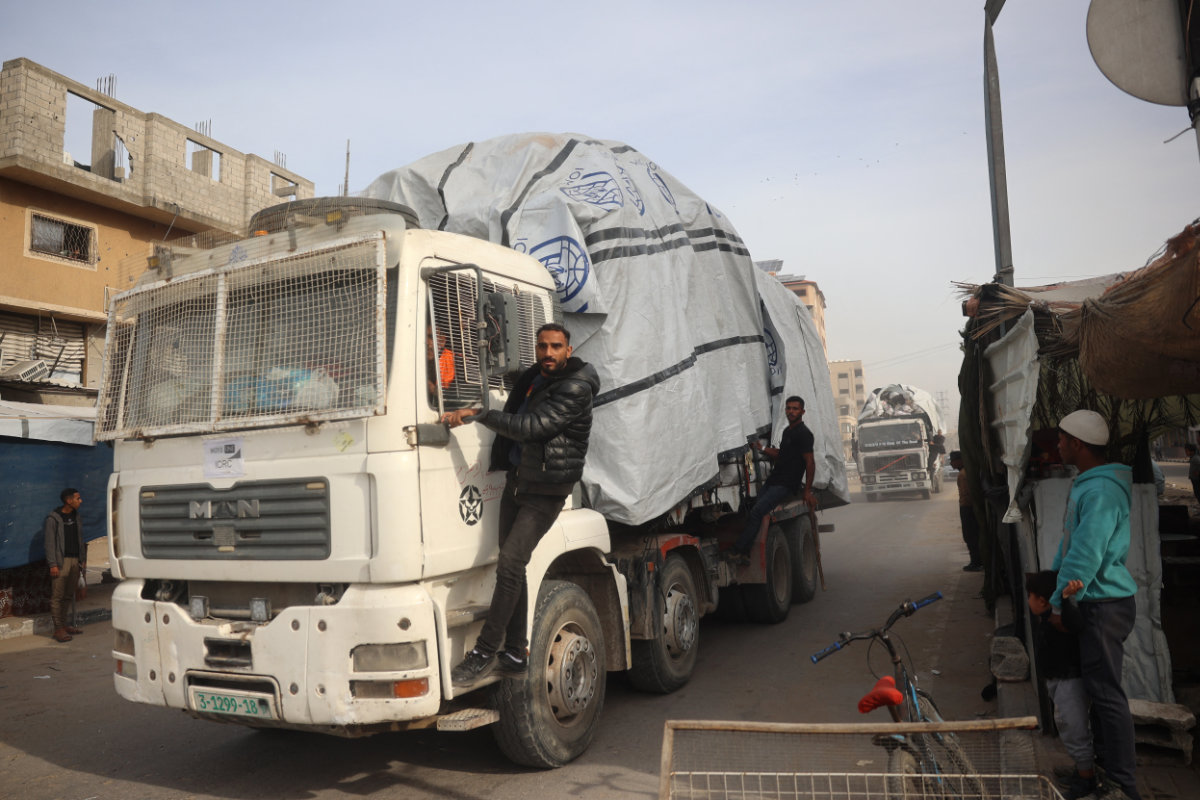
Tom Fletcher, the UN undersecretary-general for humanitarian affairs and emergency relief coordinator, has sounded the alarm about the worsening humanitarian situation, describing the context for aid delivery as among “the most dangerous” in the world.
“We deal with tough places to deliver humanitarian support,” he said in a statement on Dec. 23. “But Gaza is currently the most dangerous, in a year when more humanitarians have been killed than any on record.”
As of late November, at least 333 humanitarian aid workers had been killed in Gaza since the Oct. 7, 2023, Hamas-led attack on southern Israel sparked the conflict, according to UN figures.

Most of the casualties are staff of the UN Relief and Works Agency for Palestine Refugees in the Near East and the International Red Cross and Red Crescent Movement.
UN and US officials have accused Israel of failing to prevent gangs from looting aid convoys in Gaza, despite an October pledge to act quickly to improve the dire humanitarian situation in the enclave.
Israel denies deliberately restricting aid to Gaza or ignoring the proliferation of gangs and organized crime. It also accuses Hamas of diverting aid.
Cold winter conditions have made matters even worse for Gaza’s children. On Dec. 26, at least three infants died from hypothermia in Al-Mawasi refugee camp as temperatures dropped, the Palestinian news agency WAFA reported.

Exacerbating the situation, the Israeli government voted in October to ban UNRWA — the sole provider of aid to more than 2 million people in Gaza — starting from January. The ban follows Israeli claims that nine UNRWA staff were involved in the Oct. 7, 2023, attack.
Robert Blecher, director of the Future of Conflict program at International Crisis Group, believes Israel is “within its rights to block UNRWA on, say, national security grounds, so long as that exclusion in and of itself does not deprive civilians of aid.”
He told Arab News that although international humanitarian law “requires the rapid and unimpeded passage of humanitarian aid to those in need,” it “does not specify who must be permitted to deliver the aid.”
Two Israeli officials told The Times of Israel newspaper that the government has considered hiring private contractors to secure and deliver relief in Gaza, preventing diversion by Hamas and other armed groups.
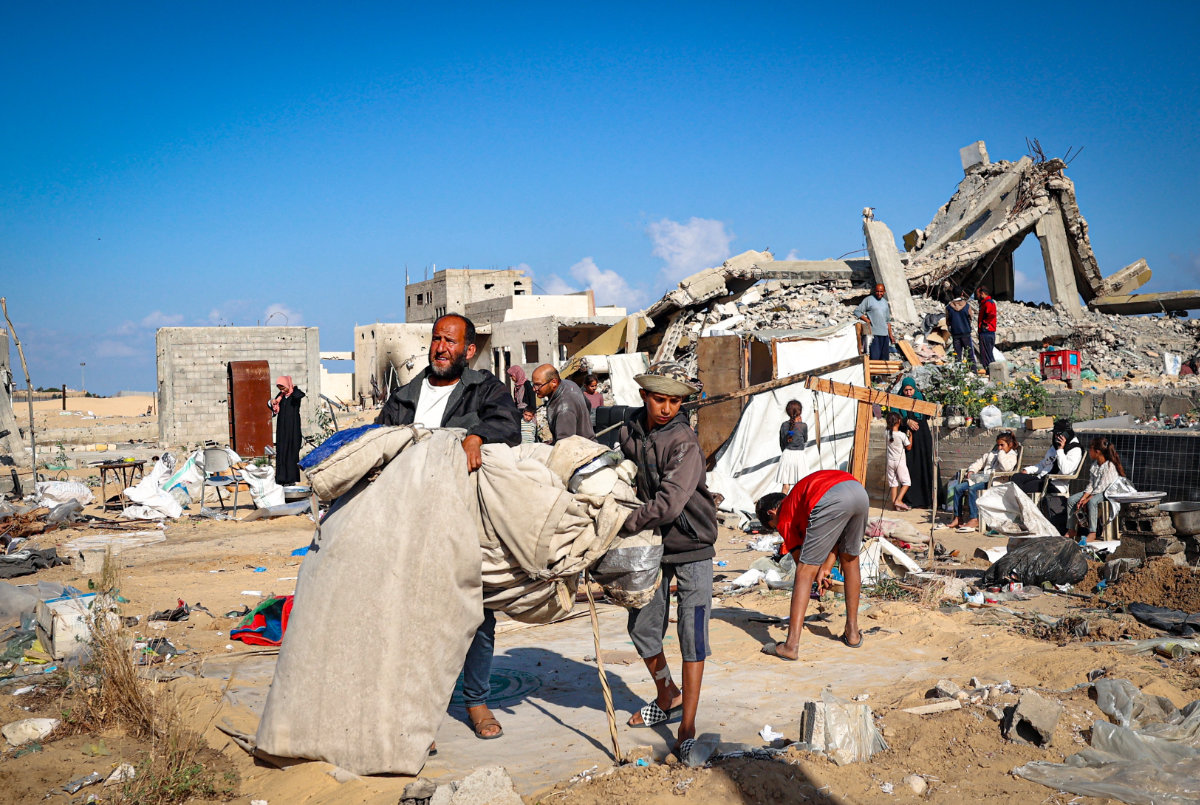
Blecher described the issue of private security contractors distributing food as a question of “feasibility,” saying:
“Theoretically speaking, if the private security contractors were to be brought in as part of a political agreement between Israel and the Palestinians to solve a technical problem, then yes, their involvement could be feasible.
“There would still be challenges of accountability and capacity, as well as a broader chipping away at the global humanitarian system, but in theory, it could work.”
Nevertheless, there are doubts about whether a state, whose prime minister and former minister of defense have been accused by the International Criminal Court of weaponizing starvation, would follow through with such a plan.
“If private security contractors are brought in without a political agreement as a replacement for Israeli soldiers, they will be seen as occupiers and treated as such,” said Blecher. “That’s the more likely scenario.”
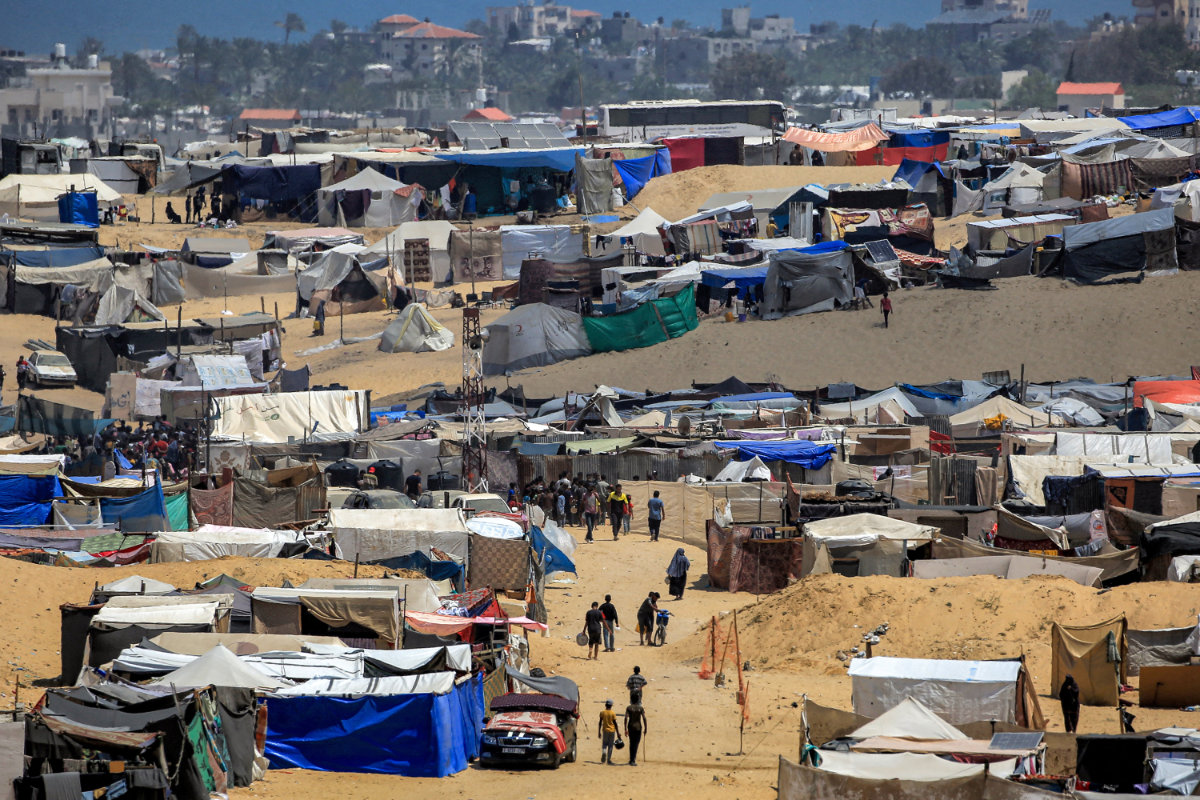
Under international humanitarian law, Israel, classified as an occupying power in Gaza, is obligated to “take all the measures in its power to restore, and ensure, as far as possible, public order and safety.”
In addition, Article 55 of the Fourth Geneva Convention requires Israel to ensure the provision of food and medical supplies to the population, while Article 56 mandates the maintenance of medical and hospital services, as well as public health and hygiene, in the occupied territory.
“It seems pretty clear to everyone that Israel is the occupying power and therefore is responsible for the well-being of the civilian population,” Khaled Elgindy, a senior fellow at the Middle East Institute, told Arab News.
“Obviously, almost everything that Israel is doing is contrary to that.”
He added: “It has heavily restricted food and humanitarian aid as a matter of policy. That was clear from day one in the pronouncements of Israeli leaders. And it’s been clear ever since.
“Now, many different groups have concluded — including Oxfam, humanitarian organizations, human rights groups, and even agencies within the US government — that Israel is using starvation as a weapon of war.”
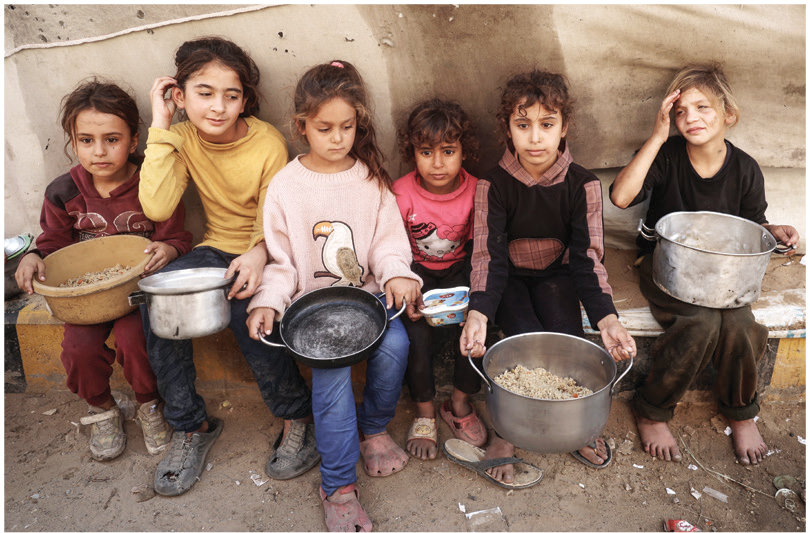
Tightening the noose on Gaza’s war-stricken population are the rising attacks on aid convoys. In October, $9.5 million worth of food and other goods were looted, representing nearly a quarter of all the humanitarian aid sent to Gaza that month, according to UN figures.
Preliminary data indicates that looting in November was significantly worse.
In one of the single worst incidents, in mid-November, a 109-truck convoy chartered by UN agencies was attacked shortly after it was permitted to pass through a southern Gaza border crossing at night, several hours earlier than previously scheduled, according to Reuters.
Although they were stationed nearby, Israeli troops reportedly did not intervene as gunmen from multiple gangs surrounded the convoy, forced the drivers out, and stole flour and other food items.
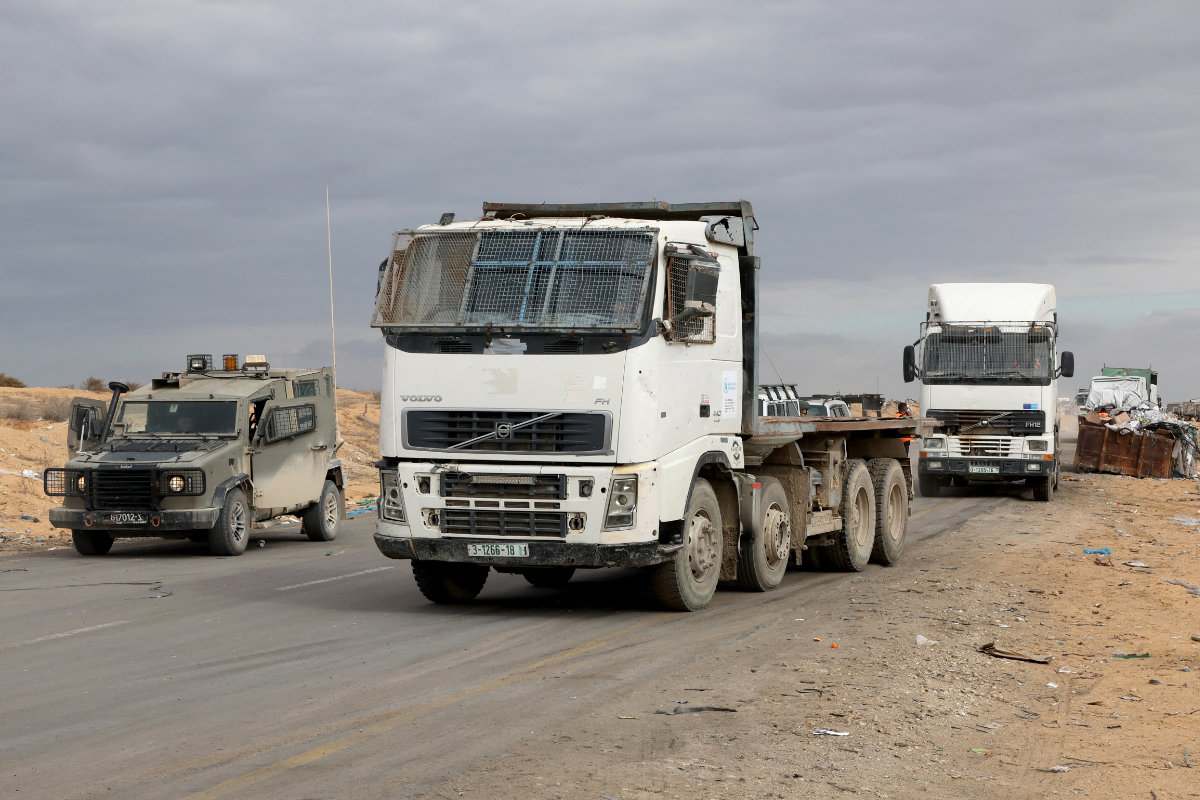
Despite the deconfliction process, in which humanitarian groups share their coordinates and agree with Israeli authorities on when and how aid is delivered, relief convoys “are still being targeted,” making it “very difficult to deliver anything,” said Elgindy.
“That’s why in many instances, we’ve seen groups like UNRWA, World Central Kitchen, and others have to suspend their aid operations in certain moments and certain places because they can’t guarantee the safety of those delivering the aid.”
Israeli forces have also been implicated in attacks on aid convoys, although they have denied deliberately targeting them. In one such attack in April, Israeli drone operators fired on three World Central Kitchen vehicles, killing seven aid workers and forcing the nongovernmental organization to pause operations in Gaza.
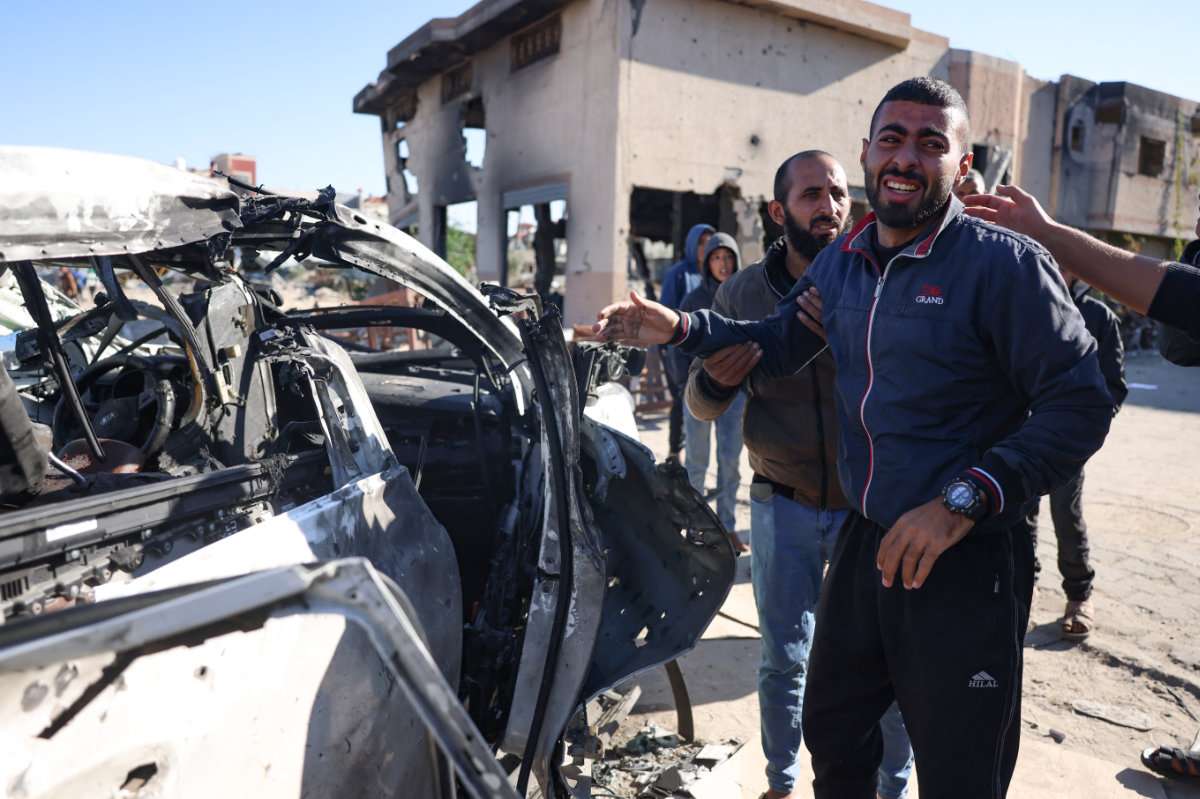
In an effort to restore order after Israel began targeting police officers in early 2024, citing their role in Hamas governance, Hamas told the BBC in November it was working on a plan to restore security to 60 percent of Gaza within a month, up from less than 20 percent.
And while some Gazans in the south welcomed the effort, others saw it as an attempt to take control of lucrative black markets.
Indeed, some Palestinians on social media have reported having to buy items that were originally intended for aid distribution.
Israel “has not allowed Hamas — the governing authority in Gaza — to regroup even as a civilian force, as a police force,” said Elgindy.
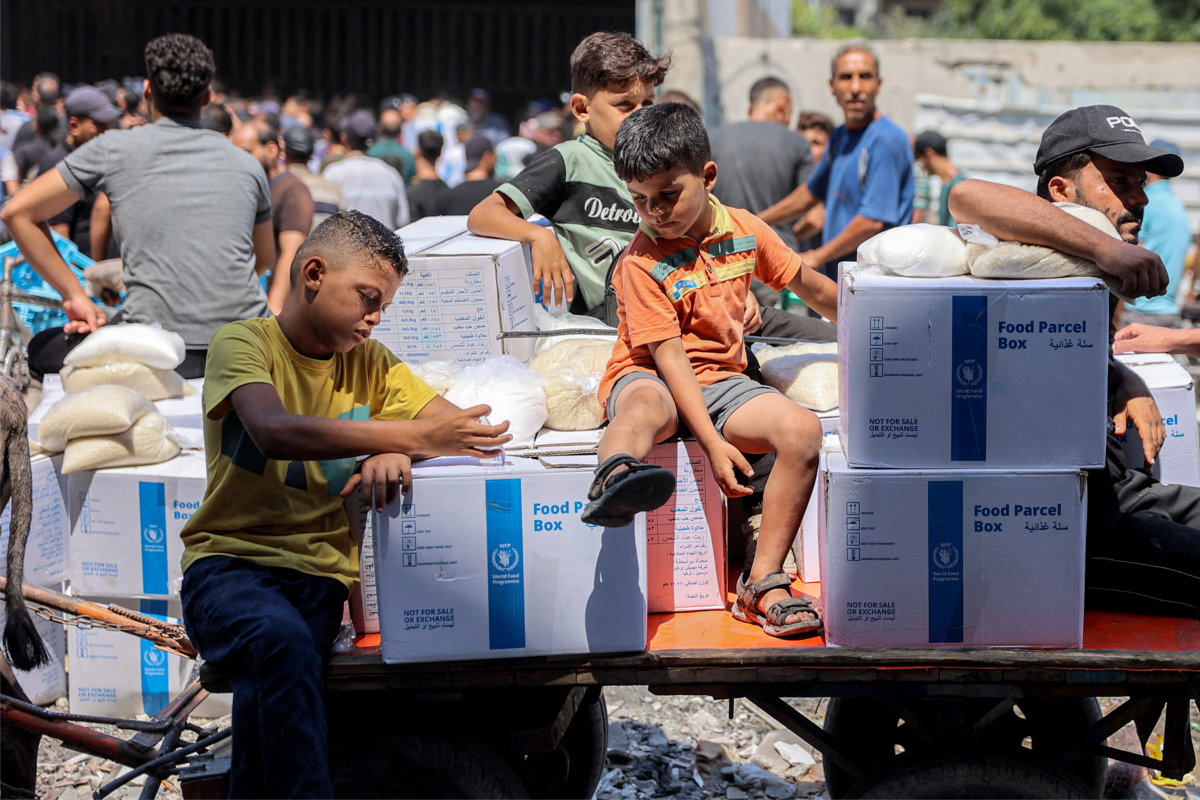
In the absence of law and order, he said Gaza has descended into a situation governed by “the law of the jungle.
“Whoever has guns — gangs and armed groups — will commandeer aid,” he said. “There have also been cases where Israeli authorities are within eyesight of the looting and they do not intervene.”
Israel is therefore “not meeting any of its obligations” under international humanitarian law, “not even in the most minimal sense of providing for the welfare of the civilian population.”





















